Ethical issues in Multi-level Marketing
VerifiedAdded on 2023/01/19
|9
|2161
|34
AI Summary
This paper covers the ethical issues in multilevel marketing through conducting a literature review on various works so as to understand the issues more clearly as well as how marketers are supposed to handle the issues.
Contribute Materials
Your contribution can guide someone’s learning journey. Share your
documents today.
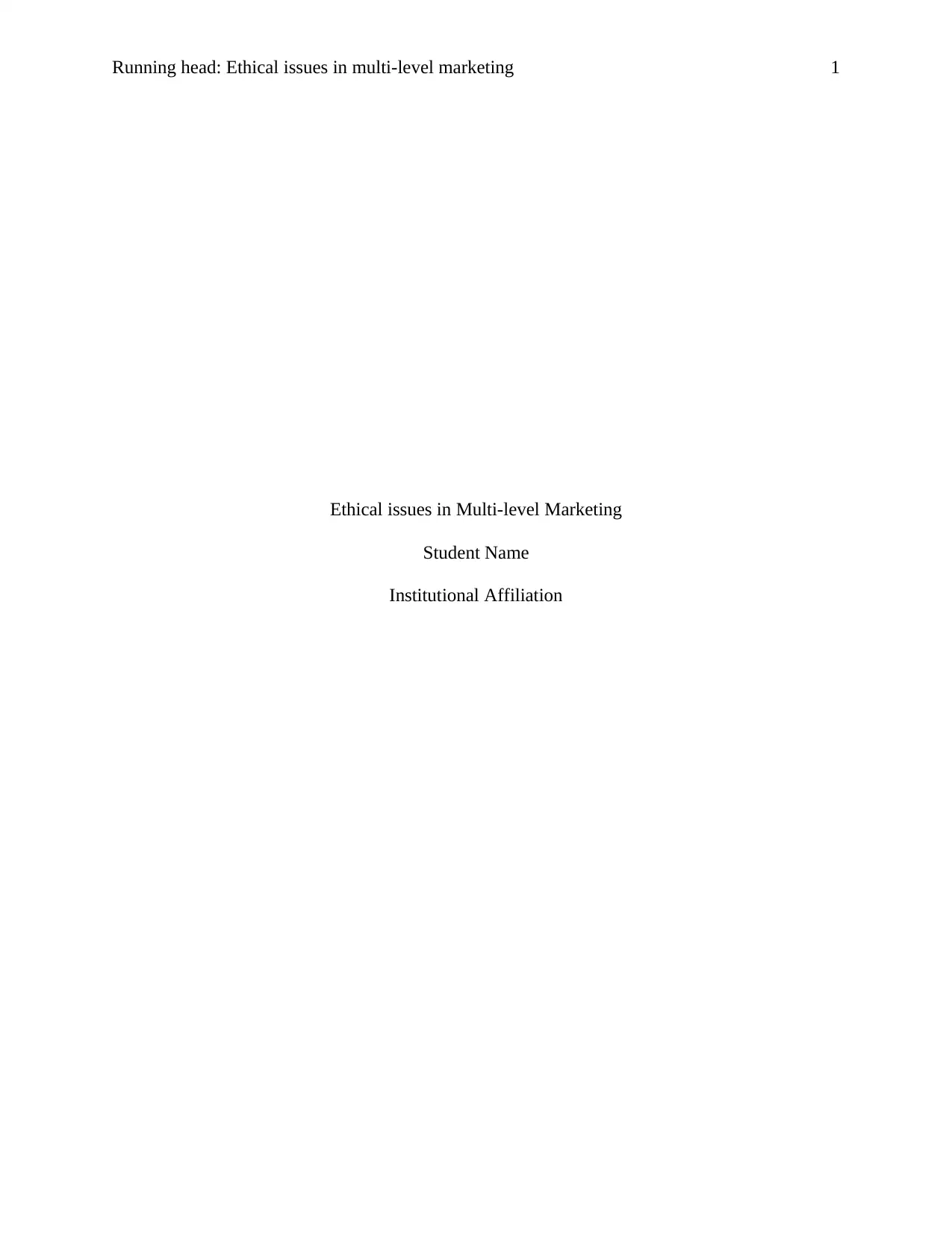
Running head: Ethical issues in multi-level marketing 1
Ethical issues in Multi-level Marketing
Student Name
Institutional Affiliation
Ethical issues in Multi-level Marketing
Student Name
Institutional Affiliation
Secure Best Marks with AI Grader
Need help grading? Try our AI Grader for instant feedback on your assignments.
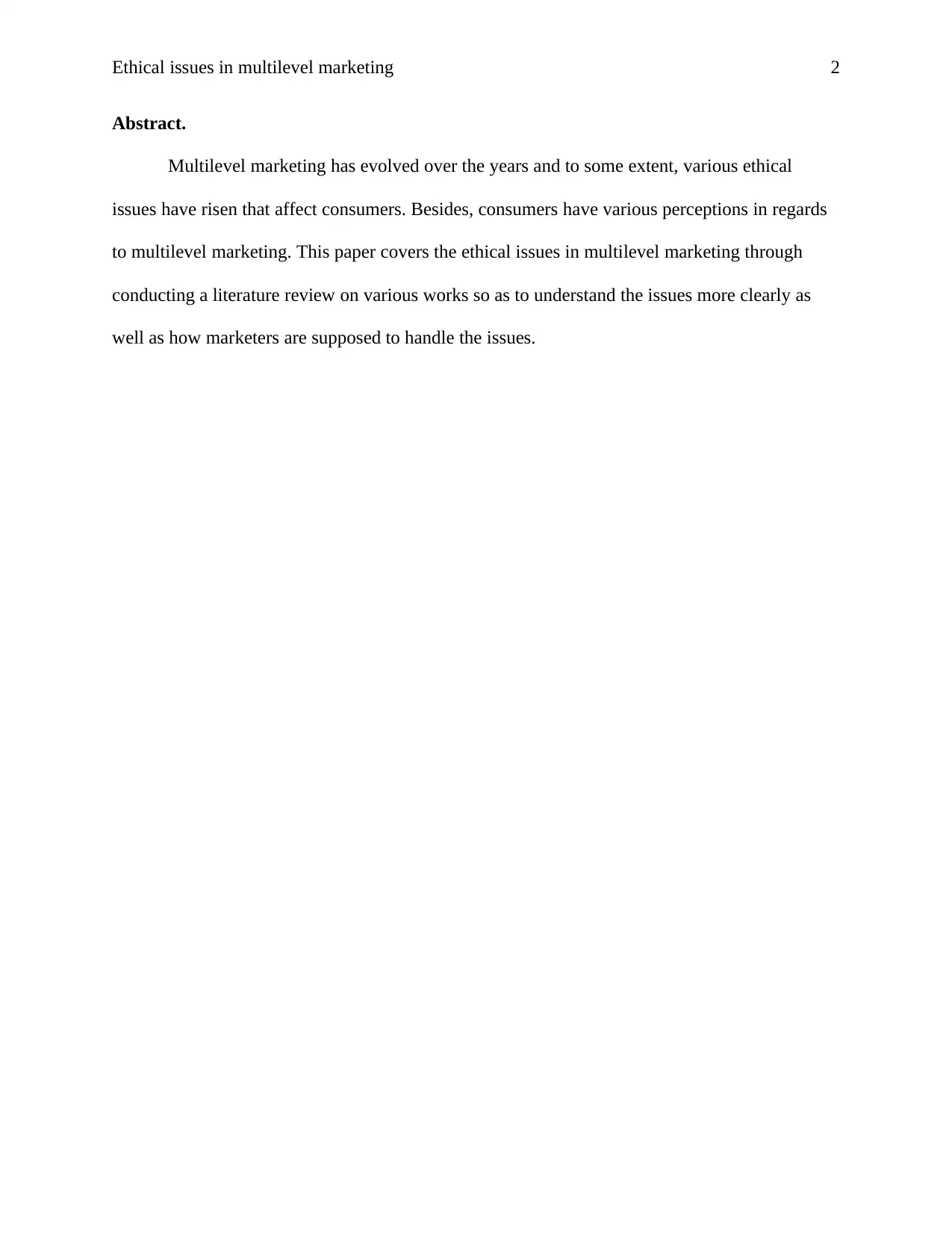
Ethical issues in multilevel marketing 2
Abstract.
Multilevel marketing has evolved over the years and to some extent, various ethical
issues have risen that affect consumers. Besides, consumers have various perceptions in regards
to multilevel marketing. This paper covers the ethical issues in multilevel marketing through
conducting a literature review on various works so as to understand the issues more clearly as
well as how marketers are supposed to handle the issues.
Abstract.
Multilevel marketing has evolved over the years and to some extent, various ethical
issues have risen that affect consumers. Besides, consumers have various perceptions in regards
to multilevel marketing. This paper covers the ethical issues in multilevel marketing through
conducting a literature review on various works so as to understand the issues more clearly as
well as how marketers are supposed to handle the issues.
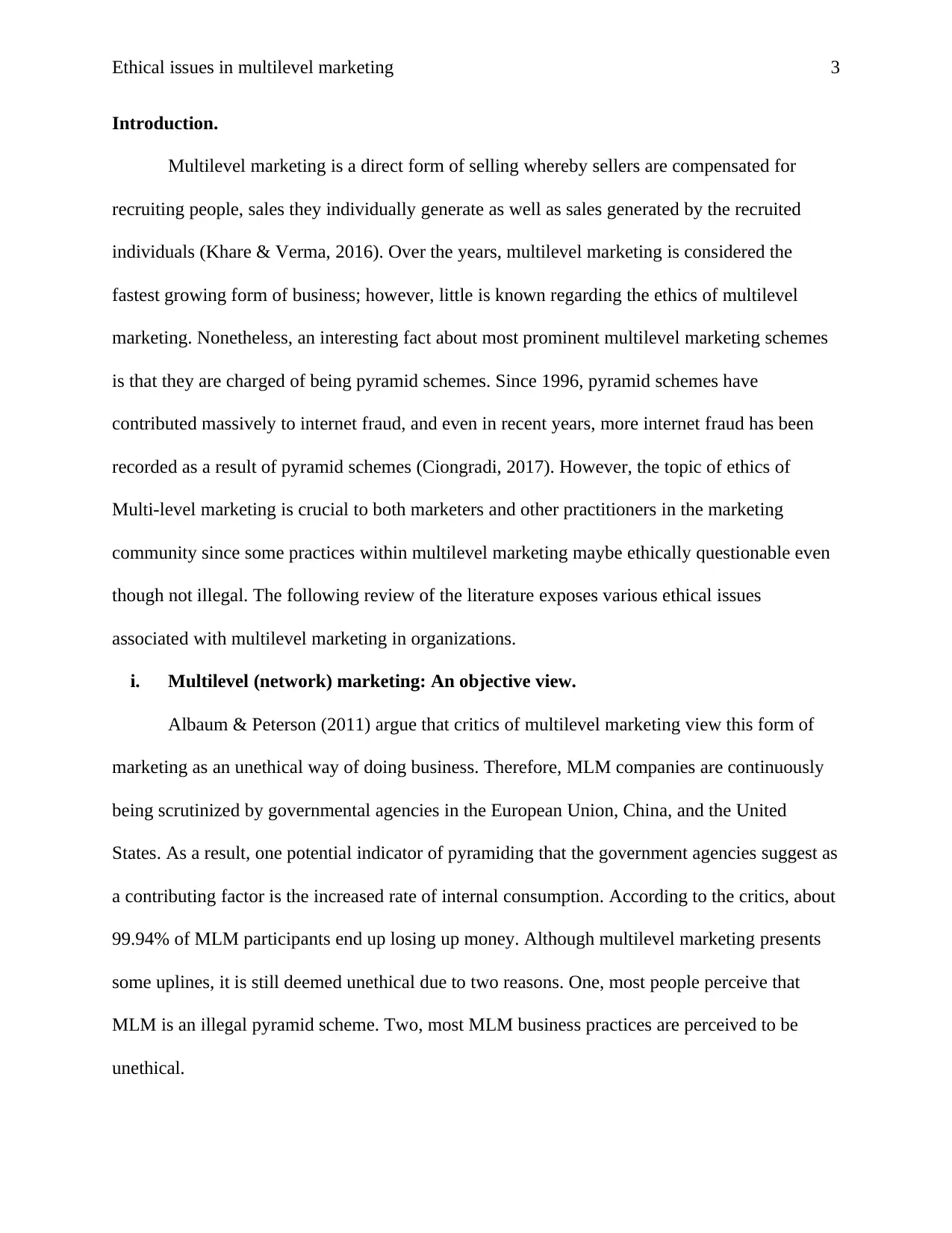
Ethical issues in multilevel marketing 3
Introduction.
Multilevel marketing is a direct form of selling whereby sellers are compensated for
recruiting people, sales they individually generate as well as sales generated by the recruited
individuals (Khare & Verma, 2016). Over the years, multilevel marketing is considered the
fastest growing form of business; however, little is known regarding the ethics of multilevel
marketing. Nonetheless, an interesting fact about most prominent multilevel marketing schemes
is that they are charged of being pyramid schemes. Since 1996, pyramid schemes have
contributed massively to internet fraud, and even in recent years, more internet fraud has been
recorded as a result of pyramid schemes (Ciongradi, 2017). However, the topic of ethics of
Multi-level marketing is crucial to both marketers and other practitioners in the marketing
community since some practices within multilevel marketing maybe ethically questionable even
though not illegal. The following review of the literature exposes various ethical issues
associated with multilevel marketing in organizations.
i. Multilevel (network) marketing: An objective view.
Albaum & Peterson (2011) argue that critics of multilevel marketing view this form of
marketing as an unethical way of doing business. Therefore, MLM companies are continuously
being scrutinized by governmental agencies in the European Union, China, and the United
States. As a result, one potential indicator of pyramiding that the government agencies suggest as
a contributing factor is the increased rate of internal consumption. According to the critics, about
99.94% of MLM participants end up losing up money. Although multilevel marketing presents
some uplines, it is still deemed unethical due to two reasons. One, most people perceive that
MLM is an illegal pyramid scheme. Two, most MLM business practices are perceived to be
unethical.
Introduction.
Multilevel marketing is a direct form of selling whereby sellers are compensated for
recruiting people, sales they individually generate as well as sales generated by the recruited
individuals (Khare & Verma, 2016). Over the years, multilevel marketing is considered the
fastest growing form of business; however, little is known regarding the ethics of multilevel
marketing. Nonetheless, an interesting fact about most prominent multilevel marketing schemes
is that they are charged of being pyramid schemes. Since 1996, pyramid schemes have
contributed massively to internet fraud, and even in recent years, more internet fraud has been
recorded as a result of pyramid schemes (Ciongradi, 2017). However, the topic of ethics of
Multi-level marketing is crucial to both marketers and other practitioners in the marketing
community since some practices within multilevel marketing maybe ethically questionable even
though not illegal. The following review of the literature exposes various ethical issues
associated with multilevel marketing in organizations.
i. Multilevel (network) marketing: An objective view.
Albaum & Peterson (2011) argue that critics of multilevel marketing view this form of
marketing as an unethical way of doing business. Therefore, MLM companies are continuously
being scrutinized by governmental agencies in the European Union, China, and the United
States. As a result, one potential indicator of pyramiding that the government agencies suggest as
a contributing factor is the increased rate of internal consumption. According to the critics, about
99.94% of MLM participants end up losing up money. Although multilevel marketing presents
some uplines, it is still deemed unethical due to two reasons. One, most people perceive that
MLM is an illegal pyramid scheme. Two, most MLM business practices are perceived to be
unethical.
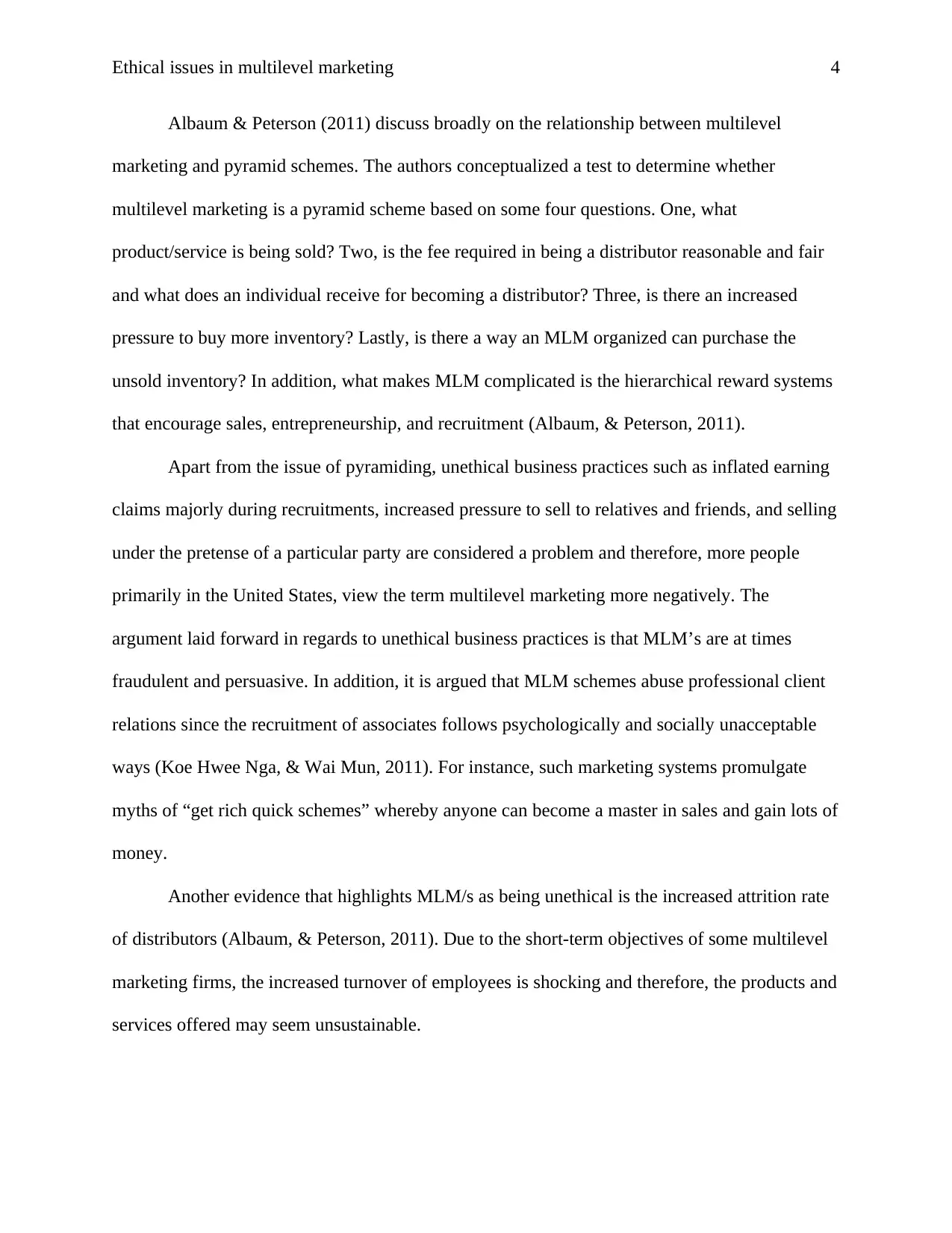
Ethical issues in multilevel marketing 4
Albaum & Peterson (2011) discuss broadly on the relationship between multilevel
marketing and pyramid schemes. The authors conceptualized a test to determine whether
multilevel marketing is a pyramid scheme based on some four questions. One, what
product/service is being sold? Two, is the fee required in being a distributor reasonable and fair
and what does an individual receive for becoming a distributor? Three, is there an increased
pressure to buy more inventory? Lastly, is there a way an MLM organized can purchase the
unsold inventory? In addition, what makes MLM complicated is the hierarchical reward systems
that encourage sales, entrepreneurship, and recruitment (Albaum, & Peterson, 2011).
Apart from the issue of pyramiding, unethical business practices such as inflated earning
claims majorly during recruitments, increased pressure to sell to relatives and friends, and selling
under the pretense of a particular party are considered a problem and therefore, more people
primarily in the United States, view the term multilevel marketing more negatively. The
argument laid forward in regards to unethical business practices is that MLM’s are at times
fraudulent and persuasive. In addition, it is argued that MLM schemes abuse professional client
relations since the recruitment of associates follows psychologically and socially unacceptable
ways (Koe Hwee Nga, & Wai Mun, 2011). For instance, such marketing systems promulgate
myths of “get rich quick schemes” whereby anyone can become a master in sales and gain lots of
money.
Another evidence that highlights MLM/s as being unethical is the increased attrition rate
of distributors (Albaum, & Peterson, 2011). Due to the short-term objectives of some multilevel
marketing firms, the increased turnover of employees is shocking and therefore, the products and
services offered may seem unsustainable.
Albaum & Peterson (2011) discuss broadly on the relationship between multilevel
marketing and pyramid schemes. The authors conceptualized a test to determine whether
multilevel marketing is a pyramid scheme based on some four questions. One, what
product/service is being sold? Two, is the fee required in being a distributor reasonable and fair
and what does an individual receive for becoming a distributor? Three, is there an increased
pressure to buy more inventory? Lastly, is there a way an MLM organized can purchase the
unsold inventory? In addition, what makes MLM complicated is the hierarchical reward systems
that encourage sales, entrepreneurship, and recruitment (Albaum, & Peterson, 2011).
Apart from the issue of pyramiding, unethical business practices such as inflated earning
claims majorly during recruitments, increased pressure to sell to relatives and friends, and selling
under the pretense of a particular party are considered a problem and therefore, more people
primarily in the United States, view the term multilevel marketing more negatively. The
argument laid forward in regards to unethical business practices is that MLM’s are at times
fraudulent and persuasive. In addition, it is argued that MLM schemes abuse professional client
relations since the recruitment of associates follows psychologically and socially unacceptable
ways (Koe Hwee Nga, & Wai Mun, 2011). For instance, such marketing systems promulgate
myths of “get rich quick schemes” whereby anyone can become a master in sales and gain lots of
money.
Another evidence that highlights MLM/s as being unethical is the increased attrition rate
of distributors (Albaum, & Peterson, 2011). Due to the short-term objectives of some multilevel
marketing firms, the increased turnover of employees is shocking and therefore, the products and
services offered may seem unsustainable.
Secure Best Marks with AI Grader
Need help grading? Try our AI Grader for instant feedback on your assignments.
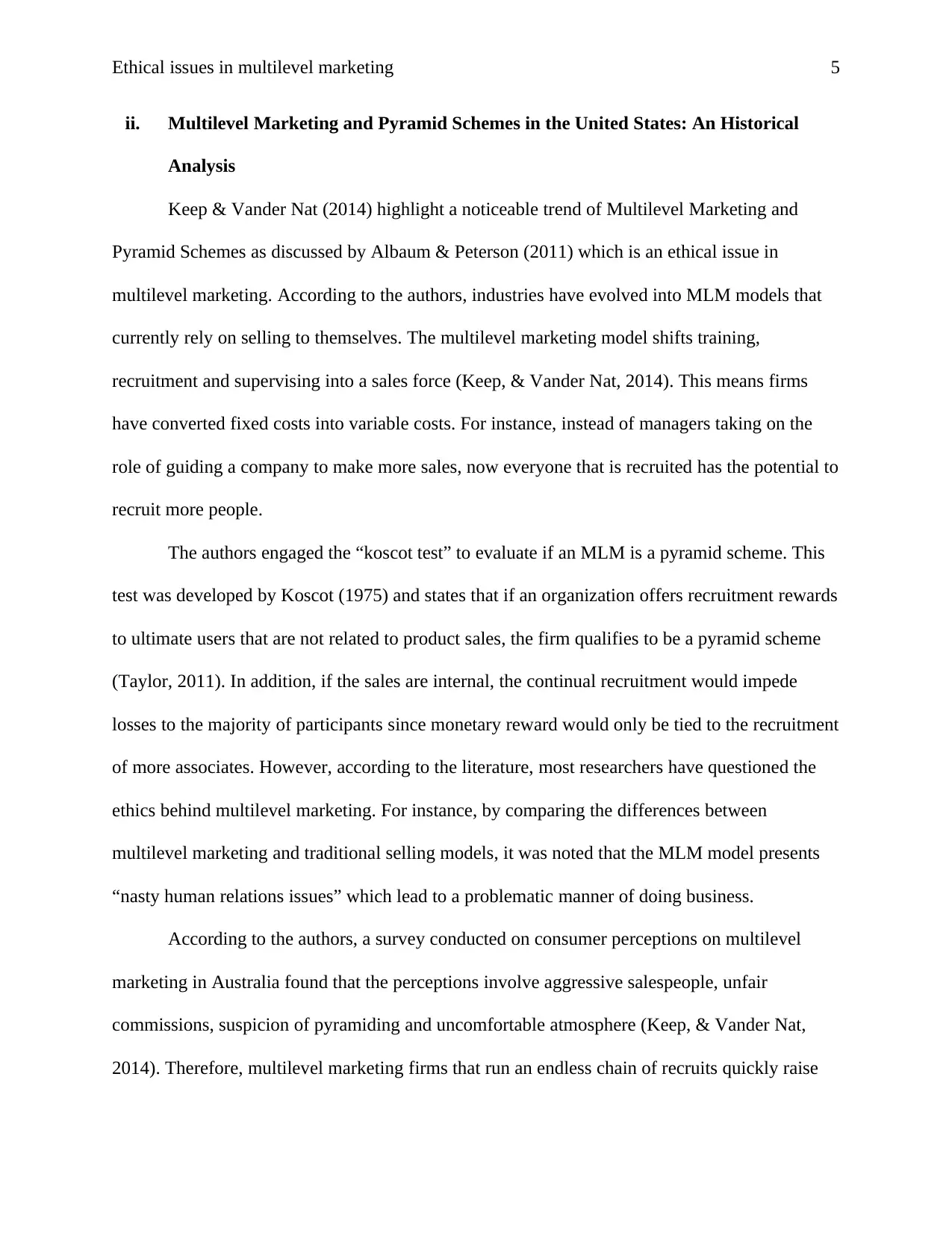
Ethical issues in multilevel marketing 5
ii. Multilevel Marketing and Pyramid Schemes in the United States: An Historical
Analysis
Keep & Vander Nat (2014) highlight a noticeable trend of Multilevel Marketing and
Pyramid Schemes as discussed by Albaum & Peterson (2011) which is an ethical issue in
multilevel marketing. According to the authors, industries have evolved into MLM models that
currently rely on selling to themselves. The multilevel marketing model shifts training,
recruitment and supervising into a sales force (Keep, & Vander Nat, 2014). This means firms
have converted fixed costs into variable costs. For instance, instead of managers taking on the
role of guiding a company to make more sales, now everyone that is recruited has the potential to
recruit more people.
The authors engaged the “koscot test” to evaluate if an MLM is a pyramid scheme. This
test was developed by Koscot (1975) and states that if an organization offers recruitment rewards
to ultimate users that are not related to product sales, the firm qualifies to be a pyramid scheme
(Taylor, 2011). In addition, if the sales are internal, the continual recruitment would impede
losses to the majority of participants since monetary reward would only be tied to the recruitment
of more associates. However, according to the literature, most researchers have questioned the
ethics behind multilevel marketing. For instance, by comparing the differences between
multilevel marketing and traditional selling models, it was noted that the MLM model presents
“nasty human relations issues” which lead to a problematic manner of doing business.
According to the authors, a survey conducted on consumer perceptions on multilevel
marketing in Australia found that the perceptions involve aggressive salespeople, unfair
commissions, suspicion of pyramiding and uncomfortable atmosphere (Keep, & Vander Nat,
2014). Therefore, multilevel marketing firms that run an endless chain of recruits quickly raise
ii. Multilevel Marketing and Pyramid Schemes in the United States: An Historical
Analysis
Keep & Vander Nat (2014) highlight a noticeable trend of Multilevel Marketing and
Pyramid Schemes as discussed by Albaum & Peterson (2011) which is an ethical issue in
multilevel marketing. According to the authors, industries have evolved into MLM models that
currently rely on selling to themselves. The multilevel marketing model shifts training,
recruitment and supervising into a sales force (Keep, & Vander Nat, 2014). This means firms
have converted fixed costs into variable costs. For instance, instead of managers taking on the
role of guiding a company to make more sales, now everyone that is recruited has the potential to
recruit more people.
The authors engaged the “koscot test” to evaluate if an MLM is a pyramid scheme. This
test was developed by Koscot (1975) and states that if an organization offers recruitment rewards
to ultimate users that are not related to product sales, the firm qualifies to be a pyramid scheme
(Taylor, 2011). In addition, if the sales are internal, the continual recruitment would impede
losses to the majority of participants since monetary reward would only be tied to the recruitment
of more associates. However, according to the literature, most researchers have questioned the
ethics behind multilevel marketing. For instance, by comparing the differences between
multilevel marketing and traditional selling models, it was noted that the MLM model presents
“nasty human relations issues” which lead to a problematic manner of doing business.
According to the authors, a survey conducted on consumer perceptions on multilevel
marketing in Australia found that the perceptions involve aggressive salespeople, unfair
commissions, suspicion of pyramiding and uncomfortable atmosphere (Keep, & Vander Nat,
2014). Therefore, multilevel marketing firms that run an endless chain of recruits quickly raise
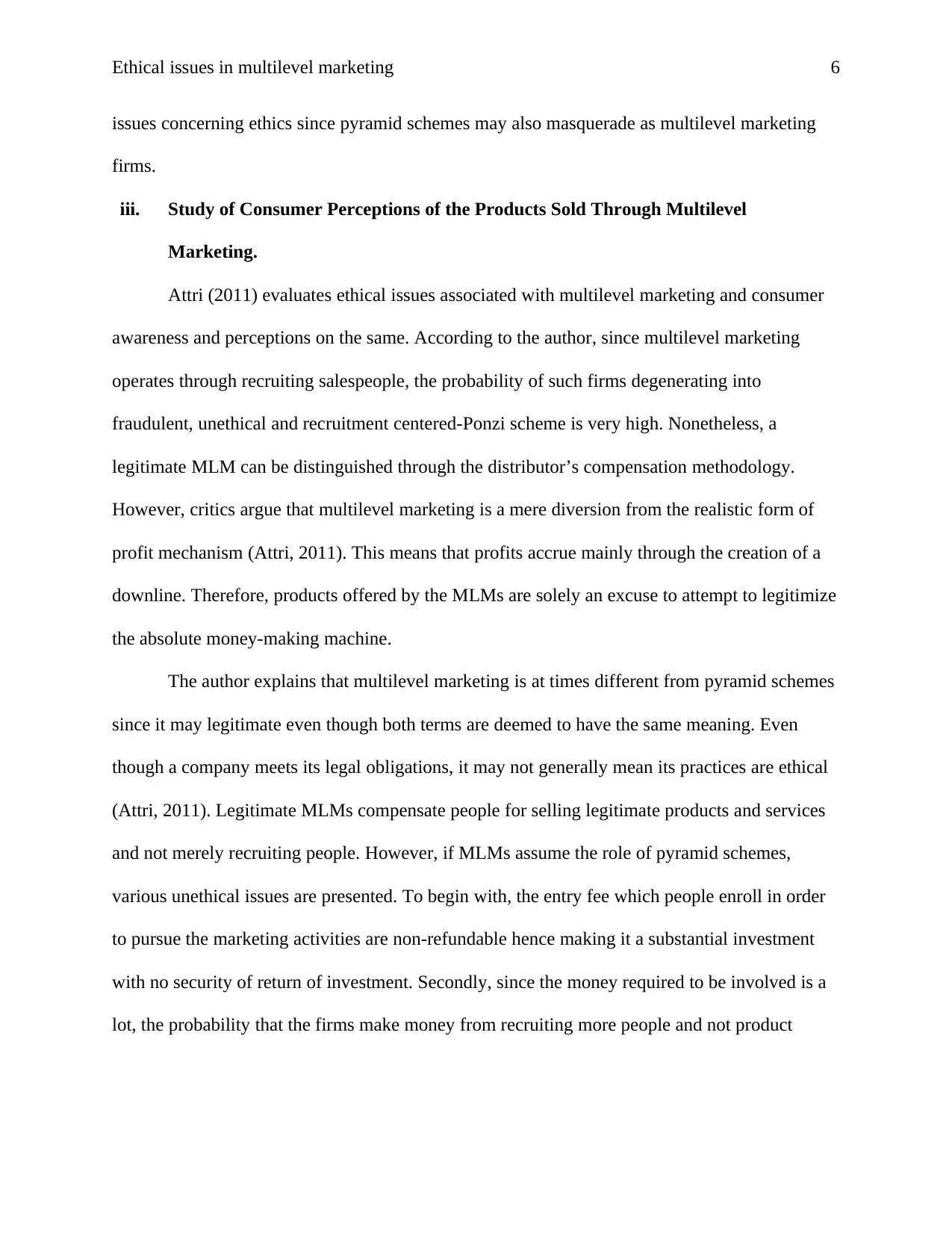
Ethical issues in multilevel marketing 6
issues concerning ethics since pyramid schemes may also masquerade as multilevel marketing
firms.
iii. Study of Consumer Perceptions of the Products Sold Through Multilevel
Marketing.
Attri (2011) evaluates ethical issues associated with multilevel marketing and consumer
awareness and perceptions on the same. According to the author, since multilevel marketing
operates through recruiting salespeople, the probability of such firms degenerating into
fraudulent, unethical and recruitment centered-Ponzi scheme is very high. Nonetheless, a
legitimate MLM can be distinguished through the distributor’s compensation methodology.
However, critics argue that multilevel marketing is a mere diversion from the realistic form of
profit mechanism (Attri, 2011). This means that profits accrue mainly through the creation of a
downline. Therefore, products offered by the MLMs are solely an excuse to attempt to legitimize
the absolute money-making machine.
The author explains that multilevel marketing is at times different from pyramid schemes
since it may legitimate even though both terms are deemed to have the same meaning. Even
though a company meets its legal obligations, it may not generally mean its practices are ethical
(Attri, 2011). Legitimate MLMs compensate people for selling legitimate products and services
and not merely recruiting people. However, if MLMs assume the role of pyramid schemes,
various unethical issues are presented. To begin with, the entry fee which people enroll in order
to pursue the marketing activities are non-refundable hence making it a substantial investment
with no security of return of investment. Secondly, since the money required to be involved is a
lot, the probability that the firms make money from recruiting more people and not product
issues concerning ethics since pyramid schemes may also masquerade as multilevel marketing
firms.
iii. Study of Consumer Perceptions of the Products Sold Through Multilevel
Marketing.
Attri (2011) evaluates ethical issues associated with multilevel marketing and consumer
awareness and perceptions on the same. According to the author, since multilevel marketing
operates through recruiting salespeople, the probability of such firms degenerating into
fraudulent, unethical and recruitment centered-Ponzi scheme is very high. Nonetheless, a
legitimate MLM can be distinguished through the distributor’s compensation methodology.
However, critics argue that multilevel marketing is a mere diversion from the realistic form of
profit mechanism (Attri, 2011). This means that profits accrue mainly through the creation of a
downline. Therefore, products offered by the MLMs are solely an excuse to attempt to legitimize
the absolute money-making machine.
The author explains that multilevel marketing is at times different from pyramid schemes
since it may legitimate even though both terms are deemed to have the same meaning. Even
though a company meets its legal obligations, it may not generally mean its practices are ethical
(Attri, 2011). Legitimate MLMs compensate people for selling legitimate products and services
and not merely recruiting people. However, if MLMs assume the role of pyramid schemes,
various unethical issues are presented. To begin with, the entry fee which people enroll in order
to pursue the marketing activities are non-refundable hence making it a substantial investment
with no security of return of investment. Secondly, since the money required to be involved is a
lot, the probability that the firms make money from recruiting more people and not product
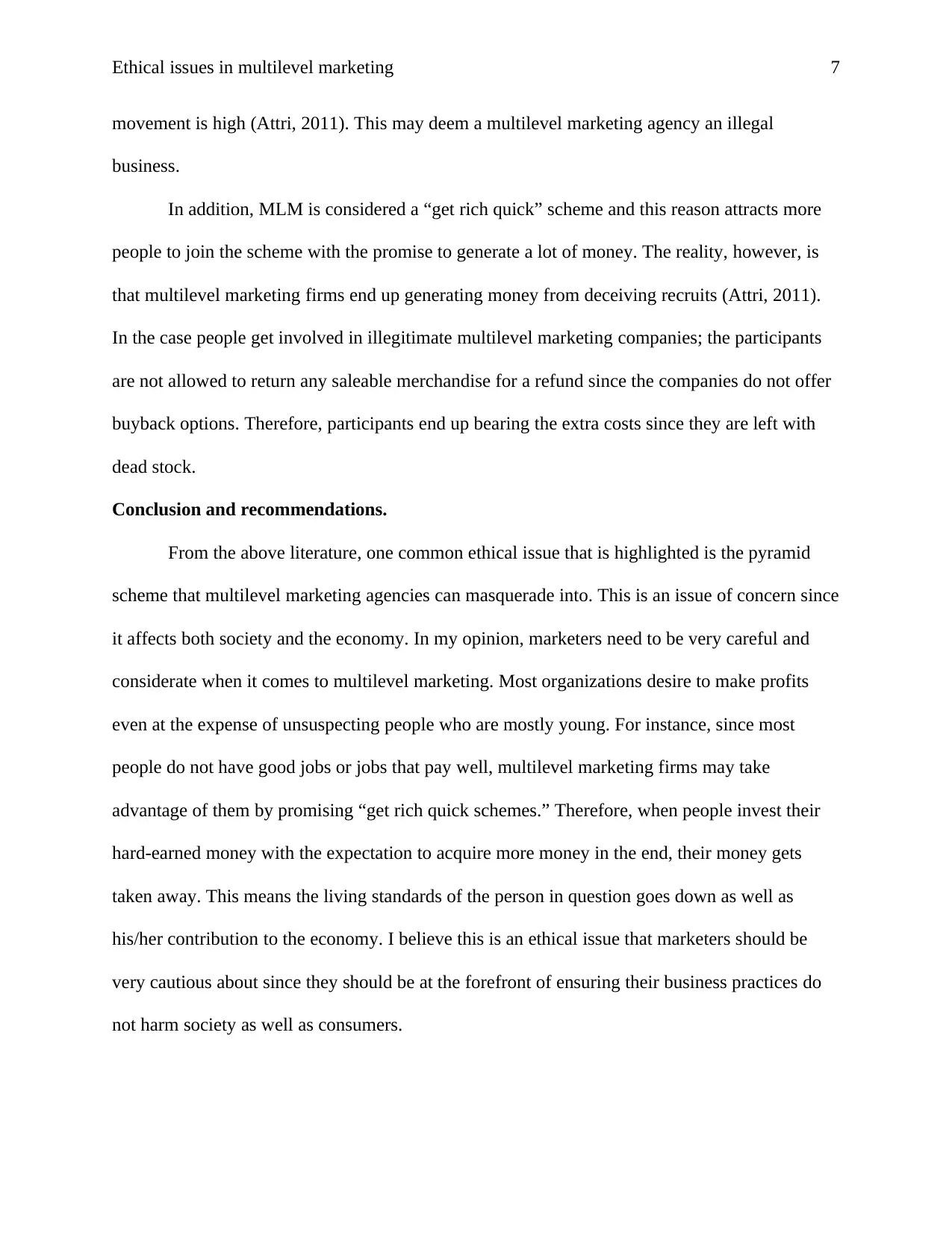
Ethical issues in multilevel marketing 7
movement is high (Attri, 2011). This may deem a multilevel marketing agency an illegal
business.
In addition, MLM is considered a “get rich quick” scheme and this reason attracts more
people to join the scheme with the promise to generate a lot of money. The reality, however, is
that multilevel marketing firms end up generating money from deceiving recruits (Attri, 2011).
In the case people get involved in illegitimate multilevel marketing companies; the participants
are not allowed to return any saleable merchandise for a refund since the companies do not offer
buyback options. Therefore, participants end up bearing the extra costs since they are left with
dead stock.
Conclusion and recommendations.
From the above literature, one common ethical issue that is highlighted is the pyramid
scheme that multilevel marketing agencies can masquerade into. This is an issue of concern since
it affects both society and the economy. In my opinion, marketers need to be very careful and
considerate when it comes to multilevel marketing. Most organizations desire to make profits
even at the expense of unsuspecting people who are mostly young. For instance, since most
people do not have good jobs or jobs that pay well, multilevel marketing firms may take
advantage of them by promising “get rich quick schemes.” Therefore, when people invest their
hard-earned money with the expectation to acquire more money in the end, their money gets
taken away. This means the living standards of the person in question goes down as well as
his/her contribution to the economy. I believe this is an ethical issue that marketers should be
very cautious about since they should be at the forefront of ensuring their business practices do
not harm society as well as consumers.
movement is high (Attri, 2011). This may deem a multilevel marketing agency an illegal
business.
In addition, MLM is considered a “get rich quick” scheme and this reason attracts more
people to join the scheme with the promise to generate a lot of money. The reality, however, is
that multilevel marketing firms end up generating money from deceiving recruits (Attri, 2011).
In the case people get involved in illegitimate multilevel marketing companies; the participants
are not allowed to return any saleable merchandise for a refund since the companies do not offer
buyback options. Therefore, participants end up bearing the extra costs since they are left with
dead stock.
Conclusion and recommendations.
From the above literature, one common ethical issue that is highlighted is the pyramid
scheme that multilevel marketing agencies can masquerade into. This is an issue of concern since
it affects both society and the economy. In my opinion, marketers need to be very careful and
considerate when it comes to multilevel marketing. Most organizations desire to make profits
even at the expense of unsuspecting people who are mostly young. For instance, since most
people do not have good jobs or jobs that pay well, multilevel marketing firms may take
advantage of them by promising “get rich quick schemes.” Therefore, when people invest their
hard-earned money with the expectation to acquire more money in the end, their money gets
taken away. This means the living standards of the person in question goes down as well as
his/her contribution to the economy. I believe this is an ethical issue that marketers should be
very cautious about since they should be at the forefront of ensuring their business practices do
not harm society as well as consumers.
Paraphrase This Document
Need a fresh take? Get an instant paraphrase of this document with our AI Paraphraser
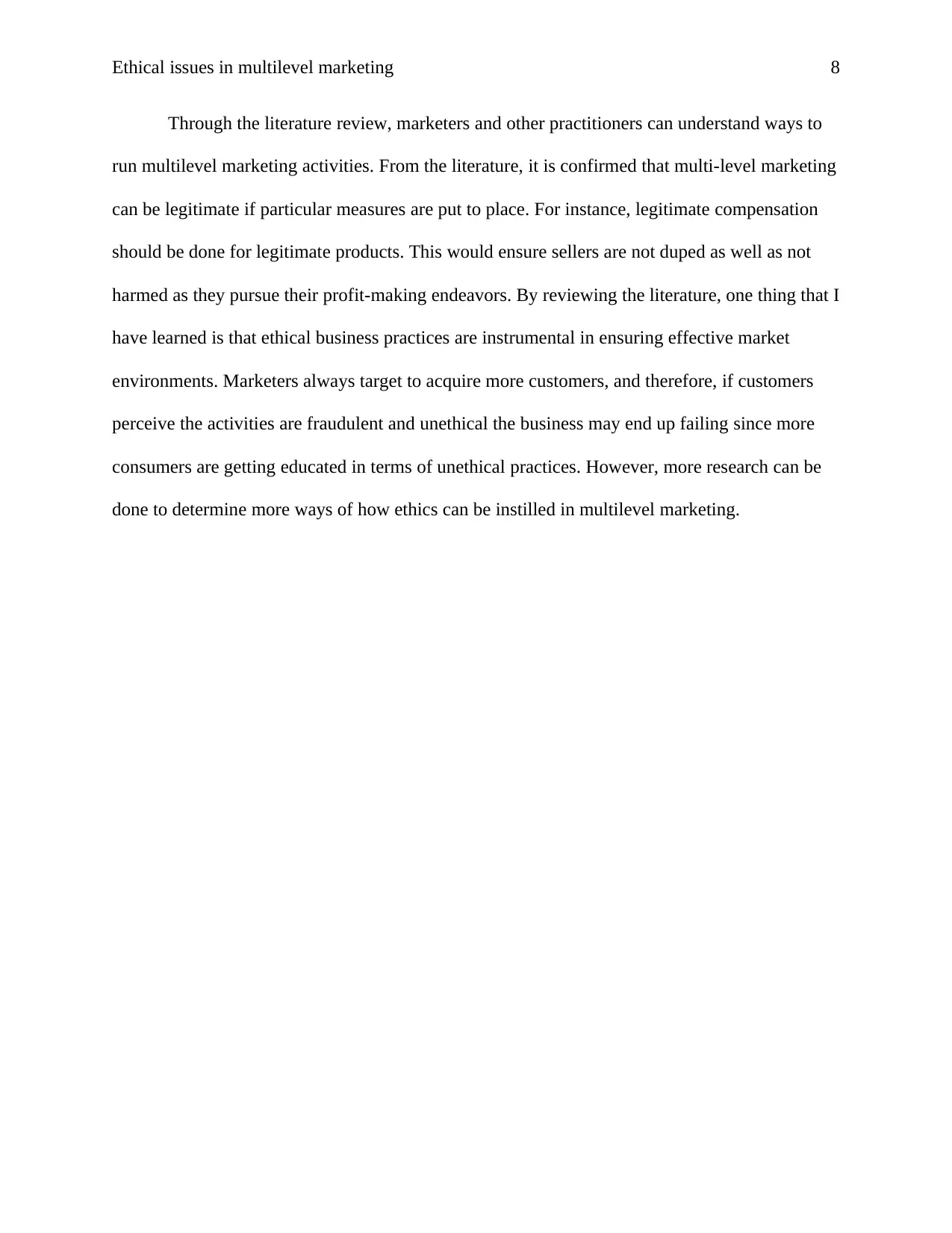
Ethical issues in multilevel marketing 8
Through the literature review, marketers and other practitioners can understand ways to
run multilevel marketing activities. From the literature, it is confirmed that multi-level marketing
can be legitimate if particular measures are put to place. For instance, legitimate compensation
should be done for legitimate products. This would ensure sellers are not duped as well as not
harmed as they pursue their profit-making endeavors. By reviewing the literature, one thing that I
have learned is that ethical business practices are instrumental in ensuring effective market
environments. Marketers always target to acquire more customers, and therefore, if customers
perceive the activities are fraudulent and unethical the business may end up failing since more
consumers are getting educated in terms of unethical practices. However, more research can be
done to determine more ways of how ethics can be instilled in multilevel marketing.
Through the literature review, marketers and other practitioners can understand ways to
run multilevel marketing activities. From the literature, it is confirmed that multi-level marketing
can be legitimate if particular measures are put to place. For instance, legitimate compensation
should be done for legitimate products. This would ensure sellers are not duped as well as not
harmed as they pursue their profit-making endeavors. By reviewing the literature, one thing that I
have learned is that ethical business practices are instrumental in ensuring effective market
environments. Marketers always target to acquire more customers, and therefore, if customers
perceive the activities are fraudulent and unethical the business may end up failing since more
consumers are getting educated in terms of unethical practices. However, more research can be
done to determine more ways of how ethics can be instilled in multilevel marketing.
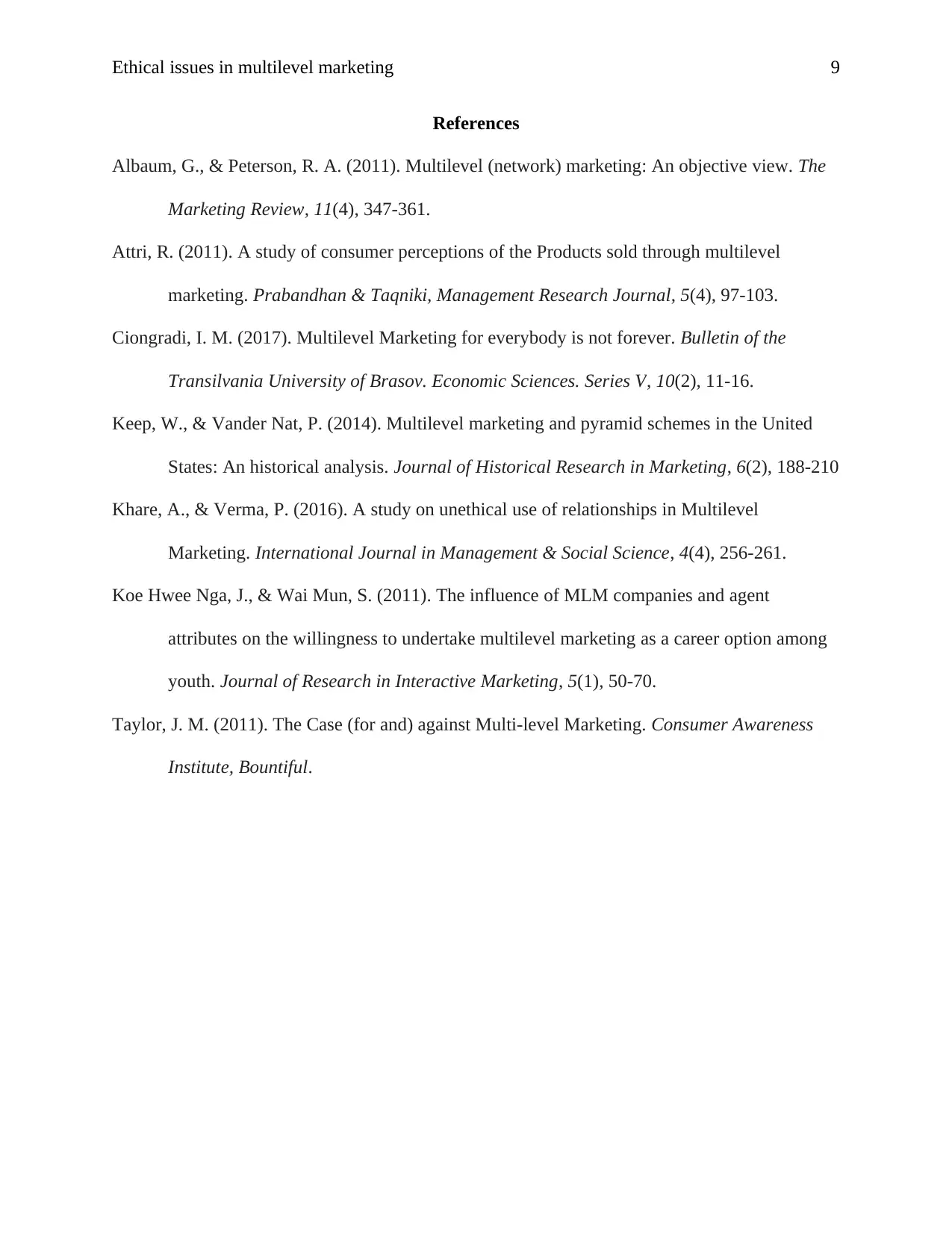
Ethical issues in multilevel marketing 9
References
Albaum, G., & Peterson, R. A. (2011). Multilevel (network) marketing: An objective view. The
Marketing Review, 11(4), 347-361.
Attri, R. (2011). A study of consumer perceptions of the Products sold through multilevel
marketing. Prabandhan & Taqniki, Management Research Journal, 5(4), 97-103.
Ciongradi, I. M. (2017). Multilevel Marketing for everybody is not forever. Bulletin of the
Transilvania University of Brasov. Economic Sciences. Series V, 10(2), 11-16.
Keep, W., & Vander Nat, P. (2014). Multilevel marketing and pyramid schemes in the United
States: An historical analysis. Journal of Historical Research in Marketing, 6(2), 188-210
Khare, A., & Verma, P. (2016). A study on unethical use of relationships in Multilevel
Marketing. International Journal in Management & Social Science, 4(4), 256-261.
Koe Hwee Nga, J., & Wai Mun, S. (2011). The influence of MLM companies and agent
attributes on the willingness to undertake multilevel marketing as a career option among
youth. Journal of Research in Interactive Marketing, 5(1), 50-70.
Taylor, J. M. (2011). The Case (for and) against Multi-level Marketing. Consumer Awareness
Institute, Bountiful.
References
Albaum, G., & Peterson, R. A. (2011). Multilevel (network) marketing: An objective view. The
Marketing Review, 11(4), 347-361.
Attri, R. (2011). A study of consumer perceptions of the Products sold through multilevel
marketing. Prabandhan & Taqniki, Management Research Journal, 5(4), 97-103.
Ciongradi, I. M. (2017). Multilevel Marketing for everybody is not forever. Bulletin of the
Transilvania University of Brasov. Economic Sciences. Series V, 10(2), 11-16.
Keep, W., & Vander Nat, P. (2014). Multilevel marketing and pyramid schemes in the United
States: An historical analysis. Journal of Historical Research in Marketing, 6(2), 188-210
Khare, A., & Verma, P. (2016). A study on unethical use of relationships in Multilevel
Marketing. International Journal in Management & Social Science, 4(4), 256-261.
Koe Hwee Nga, J., & Wai Mun, S. (2011). The influence of MLM companies and agent
attributes on the willingness to undertake multilevel marketing as a career option among
youth. Journal of Research in Interactive Marketing, 5(1), 50-70.
Taylor, J. M. (2011). The Case (for and) against Multi-level Marketing. Consumer Awareness
Institute, Bountiful.
1 out of 9
Your All-in-One AI-Powered Toolkit for Academic Success.
+13062052269
info@desklib.com
Available 24*7 on WhatsApp / Email
![[object Object]](/_next/static/media/star-bottom.7253800d.svg)
Unlock your academic potential
© 2024 | Zucol Services PVT LTD | All rights reserved.